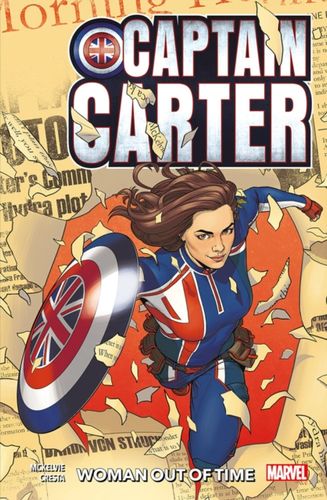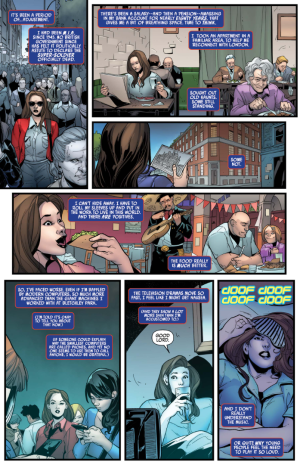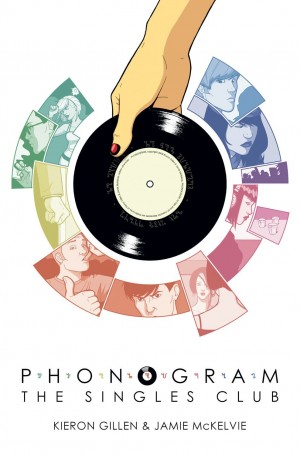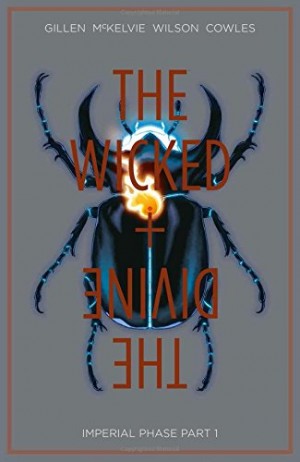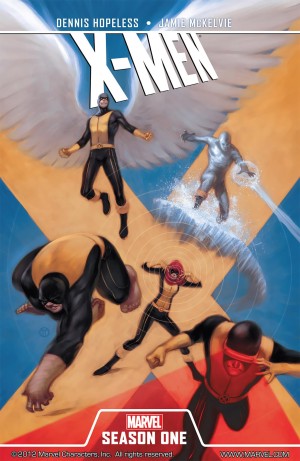Review by Tony Keen
Peggy Carter was created in the 1960s by Jack Kirby and Stan Lee as a nameless lost wartime love interest for Captain America. In the following decade, she was remembered by Steve Englehart, who named her. Her current popularity derives from her portrayal by Hayley Atwell in 2011’s Captain America: The First Avenger, and in subsequent Agent Carter productions (a short and two television series).
The idea of having Peggy, rather than Steve Rogers, take the Super-Soldier serum was first tried out in 2013 in video game Marvel Puzzle Quest, where she became Captain America. A version of this Peggy was subsequently seen in 2018 in the multiverse-spanning Exiles (where she was apparently killed in a nuclear explosion). In 2021 another variation appeared in the animated TV series What If…?, Peggy after taking the serum this time adopting the identity of Captain Carter. A version of this Captain Carter later turned up in the 2022 movie Doctor Strange in the Multiverse of Madness.
Between those appearances, Marvel issued Captain Carter, written by Jamie McKelvie, better known as an artist, character designer, and frequent collaborator with Kieron Gillen on Phonogram, Young Avengers, and The Wicked + The Divine.
And it’s good. It feels a bit like an MCU movie, being compiled from familiar story elements. Peggy’s revival in the 2020s is a reworking of the classic Avengers story of Captain America found frozen in the Arctic, whilst the main plot is strongly reminiscent of the movie Captain America: The Winter Soldier. Elizabeth Braddock, here Captain Carter’s confidante, and an ersatz Black Widow, comes from Chris Claremont and then Alan Moore’s Captain Britain comics, with her telekinetic powers remembered from her appearances in Claremont’s X-Men. STRIKE, the UK equivalent of S.H.I.E.L.D., also has its origins in Captain Britain, and a central plot twist shows McKelvie’s familiarity with multiple Invaders tales. We also get a non-Iron Man Tony Stark as a helpful electronics genius, a role alternate versions of him have played on many occasions.
Don’t let the well-worn nature of the elements put you off, though. McKelvie marshalls them with considerable skill, and delivers a tale to keep you reading. He has a skill with dialogue and scripting showing Gillen’s influence, but it remains McKelvie’s own (see sample page).
It’s also very politically engaged and angry. McKelvie is evidently not a fan of the current UK government, and expresses his views. The attacks on those who would demonise marginalised and powerless elements of the population in order to introduce authoritarian legislation seem even more relevant in 2023 than when initially written. Of course, this is a superhero comic, so justice prevails, but hopefully some readers will think about the real-world implications.
Ideally for the McKelvie fan, of course, Captain Carter would be both written and drawn by him. Sadly this was evidently not possible, and we must settle for just having his covers. ‘Settling’, however, does not do justice to the attractive and dynamic art of Marika Cresta. Her command of action sequences works well for our shield-slinging heroine, and she gives each character their own look. Definitely an artist to keep an eye on.
Overall, this is a fine graphic novel. The unresolved disappearance of Lizzie Braddock’s brother Brian hints that McKelvie has more stories to tell with Captain Carter, and let’s hope he gets the chance.
